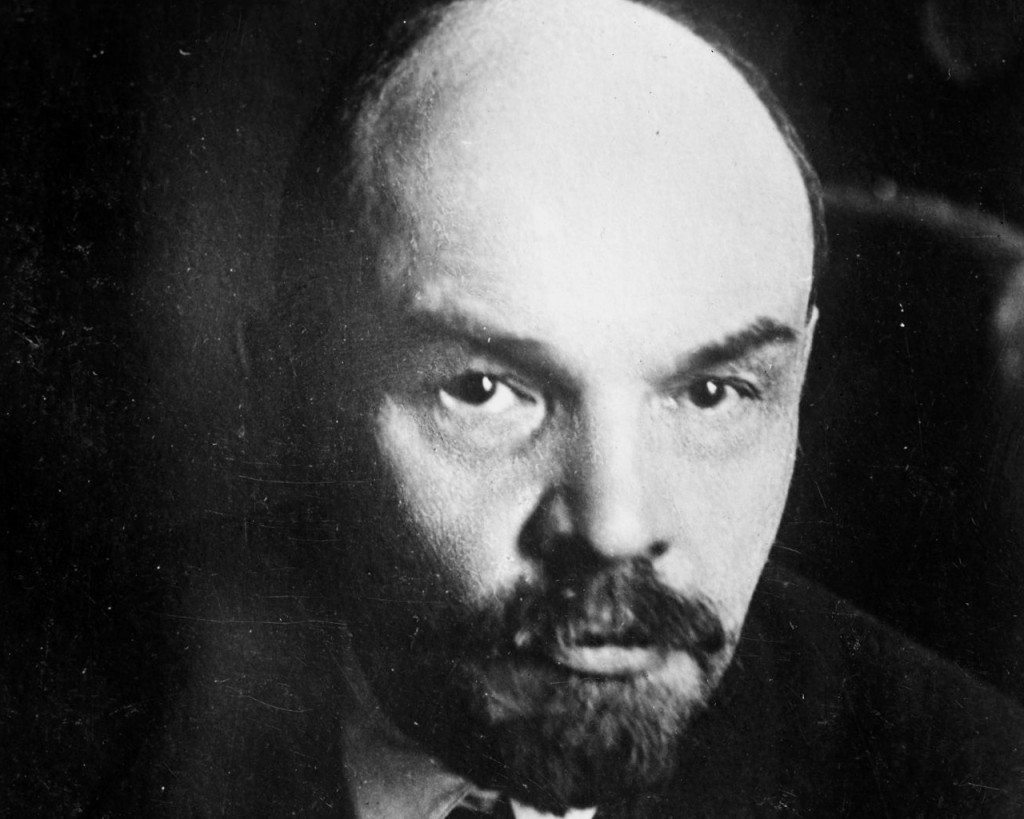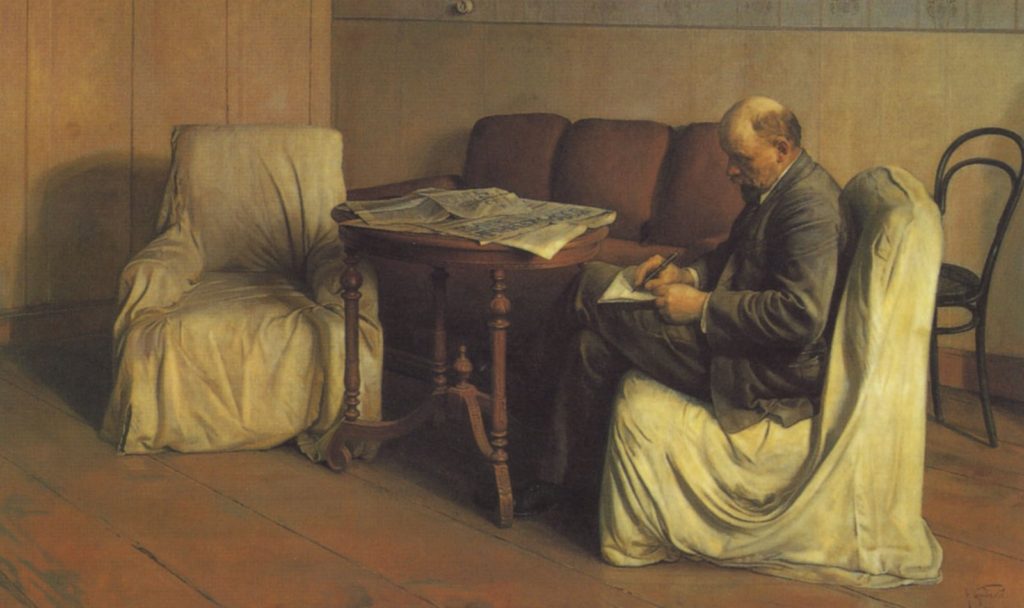
School of the Art Institute at Chicago
Wednesdays from 6-9 PM
Lakeview Building
116 S Michigan Ave, Room 202
• required / + recommended reading
Lenin readings available in Robert C. Tucker, ed., The Lenin Anthology (Norton, 1977), except (*) on marxists.org
Recommended background readings
+ Richard Appignanesi and Oscar Zarate / A&Z, Introducing Lenin and the Russian Revolution / Lenin for Beginners (1977)
+ John Reed, Ten Days that Shook the World (1919)
Week 1 | June 14
• Vladimir Ilyich Lenin, Two Tactics of Social Democracy in the Democratic Revolution (1905), pp. 120-147
• Lenin, On the Two Lines in the Revolution (1915) *
Week 2 | June 21
• Lenin, Lecture on the 1905 Revolution (1917), pp. 278-292
• Lenin, Letters from Afar (1917) *
• Lenin, April Theses (1917), pp. 295-300
Week 3 | June 28
• Lenin, The Dual Power (1917), pp. 301-304
• Lenin, The Enemies of the People (1917), pp. 305-306
• Lenin, The Beginning of Bonapartism (1917), pp. 307-310
Week 4 | July 5
• Lenin, The State and Revolution (1917), pp. 311-398
Week 5 | July 12
• Lenin, Can the Bolsheviks Retain State Power? (1917), pp. 399-406
• Lenin, Marxism and Insurrection (1917), pp. 407-412
• Lenin, Advice of an Onlooker (1917), pp. 413-414
Week 6 | July 19
• Lenin, To the Citizens of Russia! (1917), p. 417
• Lenin, Theses on the Constituent Assembly (1917), pp. 418-422
• Lenin, The Chief Task of Our Day (1918), pp. 433-437
• Lenin, The Immediate Tasks of the Soviet Government (1918), pp. 438-460
Week 7 | July 26
• Lenin, The Proletarian Revolution and the Renegade Kautsky (1918), pp. 461-476

Chicago
School of the Art Institute of Chicago
Wednesdays 6pm
116 S. Michigan Ave., Room 202
Berkeley
Berkeley City College Room 033
Mondays 6:00PM
Last seven weeks beginning June 19th
• required / + recommended reading
Lenin readings available in Robert C. Tucker, ed., The Lenin Anthology (Norton, 1977), except (*) on marxists.org
Recommended background readings
+ Richard Appignanesi and Oscar Zarate / A&Z, Introducing Lenin and the Russian Revolution / Lenin for Beginners (1977)
+ John Reed, Ten Days that Shook the World (1919)
Week 1 | June 14
• Vladimir Ilyich Lenin, Two Tactics of Social Democracy in the Democratic Revolution (1905)
• Lenin, On the Two Lines in the Revolution (1915) *
Week 2 | June 21
• Lenin, Lecture on the 1905 Revolution (1917)
• Lenin, Letters from Afar (1917) *
• Lenin, April Theses (1917)
Week 3 | June 28
• Lenin, The Dual Power (1917)
• Lenin, The Enemies of the People (1917)
• Lenin, The Beginning of Bonapartism (1917)
Week 4 | July 5
• Lenin, The State and Revolution (1917)
Week 5 | July 12
• Lenin, Can the Bolsheviks Retain State Power? (1917)
• Lenin, Marxism and Insurrection (1917)
• Lenin, Advice of an Onlooker (1917)
Week 6 | July 19
• Lenin, To the Citizens of Russia! (1917)
• Lenin, Theses on the Constituent Assembly (1917)
• Lenin, The Chief Task of Our Day (1918)
• Lenin, The Immediate Tasks of the Soviet Government (1918)
Week 7 | July 26
• Lenin, The Proletarian Revolution and the Renegade Kautsky (1918)
A workshop on the Against Equality collective by Yasmin Nair, at the 9th annual Platypus International Convention. Moderated by Nunzia Faes.
Yasmin Nair: Writer, Activist, Academic Editor at Large for Current Affairs, Freelance writer and reviewer for: Baffler, Verso, Vox, Current Affairs, Alternet, In These Times, Daily Dot, Monthly Review, Electronic Intifada, Windy City Times, and others.
From the Second International to the Frankfurt School

Loyola University
Tuesdays, 7-9:30 PM
6738 N Sheridan Ave
at Starbucks
School of the Art Institute of Chicago (SAIC)
Tuesdays, 6-9 PM
112 S Michigan Ave
MacLean Center, Room TBA
University of Chicago
Tuesdays, 6:30-9 PM
1116 E 59th St
Harper Memorial Library, Room 102
University of Illinois at Chicago
Tuesdays, 6-9 PM
701 S Morgan St
Stevenson Hall, Room 101
- required reading / + recommended reading
Recommended winter break preliminary readings:
+ Leszek Kolakowski, “The concept of the Left” (1968)
+ Richard Appignanesi and Oscar Zarate / A&Z, Introducing Lenin and the Russian Revolution / Lenin for Beginners (1977)
+ Sebastian Haffner, Failure of a Revolution: Germany 1918–19 (1968)
+ Tariq Ali and Phil Evans, Introducing Trotsky and Marxism / Trotsky for Beginners (1980)
+ James Joll, The Second International 1889–1914 (1966)
+ Edmund Wilson, To the Finland Station: A Study in the Writing and Acting of History (1940), Part II. Ch. (1–4,) 5–10, 12–16; Part III. Ch. 1–6
Film screenings: January 2017
- 37 Days(2014) [Episode 1] [Episode 2] [Episode 3]
• Fall of Eagles (1974) episodes: "Absolute Beginners," "The Secret War," and "End Game"
• Rosa Luxemburg (1986)
• Oliver Stone's Untold History of the United States (2012) Episodes A (1900-20) and B (1920-40)
• Reds (1981)
Winter–Spring 2017
- Introduction to revolutionary Marxism
Week 13. Revolutionary leadership | Jan 31, 2017
- Rosa Luxemburg, “The Crisis of German Social Democracy” Part 1 (1915)
- J. P. Nettl, “The German Social Democratic Party 1890–1914 as a Political Model”(1965)
- Cliff Slaughter, “What is Revolutionary Leadership?” (1960)
Week 14. Reform or revolution? | Feb 7, 2017
- Luxemburg, Reform or Revolution?(1900/08)
Week 15. Lenin and the vanguard party | Feb 14, 2017
- Spartacist League, Lenin and the Vanguard Party(1978)
Week 16. What is to be done? | Feb 21, 2017
- V. I. Lenin, What is to be Done?(1902)
+ Richard Appignanesi and Oscar Zarate / A&Z, Introducing Lenin and the Russian Revolution /Lenin for Beginners (1977)
Week 17. Mass strike and social democracy | Feb 28, 2017
- Luxemburg, The Mass Strike, the Political Party and the Trade Unions(1906)
+ Luxemburg, "Blanquism and Social Democracy" (1906)
Week 18. Permanent revolution | Mar 7, 2017
- Leon Trotsky, Results and Prospects(1906)
+ Tariq Ali and Phil Evans, Introducing Trotsky and Marxism /Trotsky for Beginners (1980)
Week 19. State and revolution | Mar 14, 2017
- Lenin, The State and Revolution(1917)
Week 20. Imperialism | Mar 21, 2017
- Lenin, Imperialism, the Highest Stage of Capitalism(1916)
+ Lenin, Socialism and War Ch. 1 The principles of socialism and the War of 1914–15 (1915)
Week 21. Mar 28, 2017 (spring break)
Week 22. Failure of the revolution | Apr 4, 2017
- Luxemburg, “What does the Spartacus League Want?”(1918)
- Luxemburg, “On the Spartacus Programme” (1918)
+ Luxemburg, "German Bolshevism" (AKA "The Socialisation of Society") (1918)
+ Luxemburg, “The Russian Tragedy” (1918)
+ Luxemburg, “Order Reigns in Berlin” (1919)
+ Sebastian Haffner, Failure of a Revolution: Germany 1918–19 (1968)
Week 23. March 31-April 2, 2017 [Platypus International Convention]
Week 24. Retreat after revolution | Apr 18, 2017
- Lenin, “Left-Wing” Communism: An Infantile Disorder(1920)
+ Lenin, "Notes of a Publicist" (1922)
Week 25. Dialectic of reification | Apr 25, 2017
- Lukács, “The Standpoint of the Proletariat”(Part III of “Reification and the Consciousness of the Proletariat,” 1923). Available in three sections from marxists.org: section 1 section 2 section 3
Week 26. Lessons of October | May 2, 2017
- Trotsky, The Lessons of October(1924) [PDF] + Trotsky, "Stalinism and Bolshevism" (1937)
Week 27. Trotskyism | May 9, 2017
- Trotsky, The Death Agony of Capitalism and the Tasks of the Fourth International (1938)
+ Trotsky, "To build communist parties and an international anew" (1933)
+ Trotsky, "Trade unions in the epoch of imperialist decay" (1940)
+ Trotsky, Letter to James Cannon (September 12, 1939)
Week 28. The authoritarian state | May 16, 2017
- Friedrich Pollock, "State Capitalism: Its Possibilities and Limitations"(1941) (note 32 on USSR)
- Max Horkheimer, "The Authoritarian State" (1942)
Week 29. On the concept of history | May 23, 2017
- epigraphs by Louis Menand(on Edmund Wilson) and Peter Preuss(on Nietzsche) on the modern concept of history
+ Charles Baudelaire, from Fusées [Rockets] (1867)
+ Bertolt Brecht, "To posterity" (1939)
+ Walter Benjamin, "To the planetarium" (from One-Way Street, 1928)
+ Benjamin, "Experience and poverty" (1933)
+ Benjamin, Theologico-political fragment (1921/39?) - Benjamin, "On the Concept of History" (AKA "Theses on the Philosophy of History") (1940) [PDF]
- Benjamin, Paralipomena to "On the Concept of History" (1940)
Week 30. Reflections on Marxism | May 30, 2017
- Theodor Adorno, “Reflections on Class Theory”(1942)
- Adorno, “Imaginative Excesses”(1944–47)
+ Adorno, Dedication, "Bequest", "Warning: Not to be Misused" and "Finale", Minima Moralia (1944–47)
+ Horkheimer and Adorno, "Discussion about Theory and Praxis" (AKA "Towards a New Manifesto?") [Deutsch] (1956)
Week 31. Theory and practice | Jun 7, 2017
- Adorno, “Marginalia to Theory and Praxis” (1969)
- Adorno, “Resignation” (1969)
+ Adorno, “On Subject and Object” (1969)
+ Adorno, “Late Capitalism or Industrial Society?” (AKA “Is Marx Obsolete?”) (1968)
+ Esther Leslie, Introduction to the 1969 Adorno-Marcuse correspondence (1999)
+ Adorno and Herbert Marcuse, correspondence on the German New Left (1969)
Panelists:
Bill Pelz, director of the Institute of Working Class History
Mimi Soltysik, Socialist Party USA
Panel Description
Electoral politics are a longstanding problem for the U.S. left. In recent decades, a number of parties have formed as an alternative to the Democratic Party: the Labor Party, the Green Party, and now, the Justice Party. However, these parties risk becoming little more than networks of activists or pressure groups on the Democratic Party, and it still remains unclear whether a serious electoral challenge to the Democratic Party is possible. Many progressives blame the “first-past-the-post” structure of U.S. elections, contra labour-friendly parliamentary systems; yet others insist that this procedural focus is misplaced. Leninists charge some quarters of the Left with misunderstanding the proper relationship of the party to the state; but for many, it remains unclear how State and Revolution bears upon the present. Most activists grant the desirability of a viable party to the left of the Democrats, but why exactly such a party is desirable-- to win reforms? to spread emancipatory consciousness?-- is contested as well. These are old questions for the American left-- as old as Henry George, Daniel De Leon, and the 1930s American Labor Party, perhaps the high point of independent electoral politics in the U.S. This panel will investigate several contemporary approaches to electoral politics to draw out the theories that motivate Leftist third parties; it will also ask how the historical achievements and failures of third parties bear upon the present.
Questions:
How does the present election represent an opportunity for the development of a third party? In what ways have Bernie Sanders, Donald Trump, Jill Stein, and Gary Johnson each helped develop a window of opportunity for a third party? In what ways might these figures be responsible for miseducating, depoliticizing, or simply misdirecting potential allies?
What conditions would a Clinton or Trump administration produce for the left? How would each represent a challenge to the Left?
How might a third party avoid simply becoming either an instrument for pressuring the Democratic Party to the Left or a mere recruiting tool for activist and sectarian organizations? In other words: what are the practical and theoretical obstacles to the development of the Left beyond the default form of activity that have characterized it since the mid-20th century?
While we take for granted that a third party would have to distinguish itself from the two major parties, how could a third party attempt to draw from voters from both the Democrats and the Republicans?
The rise of progressivism and socialism in the late 19th/early 20th century defined every attempt at the development of a third party in the 20th century. How are progressive and socialist politics distinct and/or related? What role would each play in the development of a mass third party for the 21st century?

